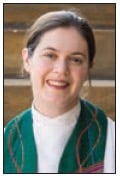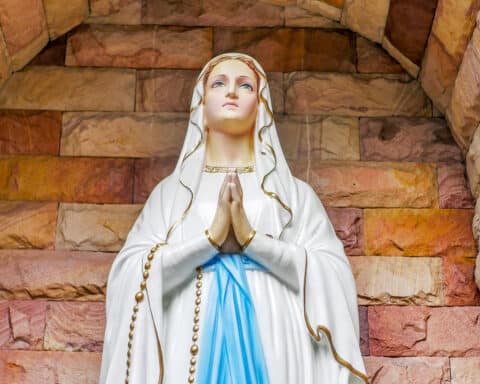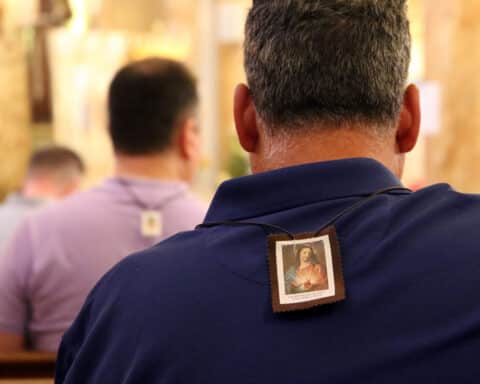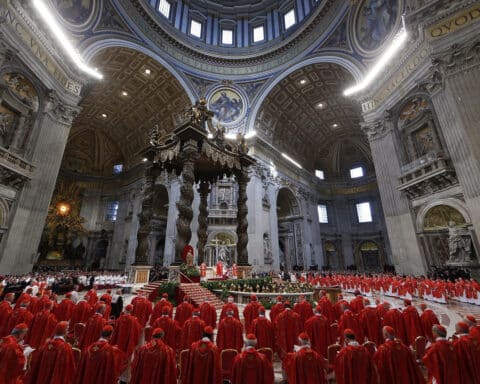There’s something different about Mary.
In a new book from Christian Associates of Southwest Pennsylvania (CASP), she’s a bewildered teenager and an empowered prophet. She’s the Second Eve, the tent of God’s Word, the Living Ark and a model of mystical prayer.
“She’s notable because she’s so ordinary and because she’s so extraordinary,” the Rev. Liddy Barlow wrote in “Blessed Art Thou Among Women: Southwest Pennsylvania Preaches on Mary, Mother of Jesus.” “She’s all of us and yet she stands apart.”
‘Learn from each other’

Rev. Barlow, a pastor in the United Church of Christ, is executive minister of CASP and edited the second book of the Pittsburgh-based organization’s series, “The Word in Our Voices.” The first book, “I Was a Stranger and You Welcomed Me: Southwest Pennsylvania Preaches on Immigration and Refugees,” was published in September.
The book on Mary includes sermons, blog posts, essays and poetry from 19 bishops, priests, pastors, deacons and vowed religious of Catholic, Protestant and Orthodox backgrounds.
“We chose Mary for the second volume because she’s important to all of us, but her persona and her work are interpreted in different ways,” Rev. Barlow said. “To me, that diversity is exciting. We have so much to learn from each other, and this project helped us to do that. What we find as common ground is a reverence for Mary, even though we name it and express it in different ways.”
Many Protestant traditions wouldn’t consider Mary an intercessor, she added, but still find her story a compelling model of faith.
“So many of the pieces in the book are about the leap of faith that Mary takes in saying yes to this astonishing news, in her willingness to take on this tremendous, terrifying, wonderful and beautiful opportunity to be the mother of God,” she said. “That’s something that we all find compelling and a true model for us in our daily lives.”
Protestant interest
A collaboration of ideas about Mary might not have been possible in the past.
“I’m a cradle Presbyterian, 58 years old, and during my childhood I definitely picked up a sense of warnings against what one of my professors called Mariology,” said Pastor Dave Carver of First United Presbyterian Church in Crafton Heights. “There were warnings about the dangers of praying to anyone other than God the Father, and that an overly aggressive veneration of Mary might lead to considering her a fourth person in the Holy Trinity. But I think that this book is a great example that many in the Protestant community have come to recognize that Mary is clearly a model of faith in all kinds of ways.”
He submitted “I Can Do That,” a sermon from Mother’s Day 2015. Mary, he said, was an unwed, peasant teenager when the Lord asked her if she was willing to see what God had in mind for her and for the entire world.
“Can you dare to believe that God is willing and able to enter into the messed-upness of your life?” Pastor Carver asked. “Can you seek to behold where and how that can be? And then, can you say yes?”
In an Advent sermon in 2017, Pastor Kerri Clark of Trinity Lutheran Church in Connellsville noted that “to our detriment” Protestants don’t spend much time thinking about Mary because of misunderstanding the Catholic devotion and fear of making her into an idol. But the lesson to be learned from her is in the archangel’s message: She found favor with God.
“Gabriel’s words are for Mary, but they are also for us: Do not be afraid,” she said. “Along with Mary, we, too, are called to be bearers of Christ.”
Pastor Clark called the book a positive way for Christians to unite through what they have in common. “I think that any chance we have to highlight our similarities rather than our differences really points to the unity that we share in Christ,” she said.
Openness to Mary
The Very Rev. Father K. George Johnson, rector of St. John the Baptist Orthodox Church in Johnstown, wrote about Mary as the Mother of God, the first of the saints and fully human as she gave the human nature to Jesus. “He must be one of us,” he wrote, “therefore she is one of us.”
Bishop David A. Zubik of the Diocese of Pittsburgh, calls her “our bright queen, Star of the Sea,” and the one who provided Luke with the early Gospel narratives. The Rev. Eric McIntosh, rector of St. James Episcopal Church in Wilkinsburg wrote a litany of praises to her as “blessed above all women.”
| Our Sunday Visitor, Vol. 1, Issue 1 |
|---|
|
The subject of Mary and Protestants was tackled in the very first issue of Our Sunday Visitor, in May 1912. “A Whole Army of Protestants Think That the Blessed Virgin Mary Should Be Honored” declared the headline. “… Catholics are often asked why they pay any mark of honor to this Blessed Virgin Mary. The answer which so spontaneously suggests itself is: If an archangel could so honor her, if God Himself so honored her even before she consented to become the mother of His Son, then we have many additional and stronger reasons to honor her now — after her elevation to incomparable dignity: after God made her person His living tabernacle; after she gave to Him His human life; after she further endeared herself to Him at Bethlehem, in Egypt, at Nazareth; after Christ Himself honored her and “was subject to her;” after the martyrdom she underwent with Him on Calvary; after she was given to us with His last words as our Mother.” |
The Protestant writers hold Mary in high esteem, but stop short at Catholic teachings on the Immaculate Conception and the Assumption. That’s the major difference in who Christians believe that she is.
“I see more openness to the person and role of Mary among many Christian denominations,” said Bishop Edward Malesic of the Diocese of Greensburg, whose submission is about the Assumption and Our Lady of Fatima. “Certainly, much of the historical hostility toward the importance of Mary in salvation history is no longer so evident among most of our Protestant brothers and sisters. This book is a sign that denominations other than the Catholic and Orthodox Churches want to reflect more on Mary’s significance to Jesus and his followers. This is a positive development in the ecumenical movement of our time.”
Reverend Barlow felt blessed by her role as editor. “It was a devotional process to discover insights that are helpful for my own walk in faith,” she said.





